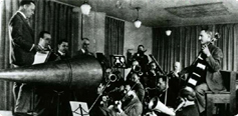 Now’s the time of year when thoughts turn to modules beginning in October. As with all the members of the music department, I was heavily involved in producing A342, ‘Central questions in the study of music’, and was particularly pleased to be able to incorporate the study of Hollywood film music, which is my main area of research. I created a series of videos to introduce the topic, and spent a rather interesting day filming in the music research studio with a production company: they took a long time trying to get ‘arty’ shots of the projector light! The videos explore what music contributes to our understanding of Hollywood narratives using clips from all sorts of film: from Casablanca and Citizen Kane to Star Wars and Raiders of the Lost Ark.
Now’s the time of year when thoughts turn to modules beginning in October. As with all the members of the music department, I was heavily involved in producing A342, ‘Central questions in the study of music’, and was particularly pleased to be able to incorporate the study of Hollywood film music, which is my main area of research. I created a series of videos to introduce the topic, and spent a rather interesting day filming in the music research studio with a production company: they took a long time trying to get ‘arty’ shots of the projector light! The videos explore what music contributes to our understanding of Hollywood narratives using clips from all sorts of film: from Casablanca and Citizen Kane to Star Wars and Raiders of the Lost Ark.
What about the rest of the module, though?
What does music mean? What does it do? These are the questions at the heart of A342. You will explore how music conveys meanings and impacts its social contexts, before moving into investigations of audiences, performances, and film music. The module incorporates a focus on the transmission of music, examining how it is edited, notated, and recorded. The final part looks at music in relation to specific social and historical contexts, incorporating case studies of works of western art music from the eighteenth, nineteenth, and twentieth centuries.
Don’t worry if you’re not a fan of film music, though. It’s one small part of a module that also covers a wide range of repertoire and styles including: the music of Handel, Beethoven, Chopin, Schumann, Verdi, Mahler, Messiaen, and Judith Weir; the music of sub-Saharan Africa; jazz and recording; and the transmission of reggae. Assessments are essay based and although there’s an exam at the end of the module, please don’t worry: there’s plenty of support provided!
You can try a free taster of the course here, and to find out more and sign up, click here.
